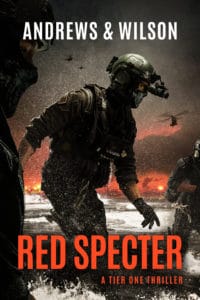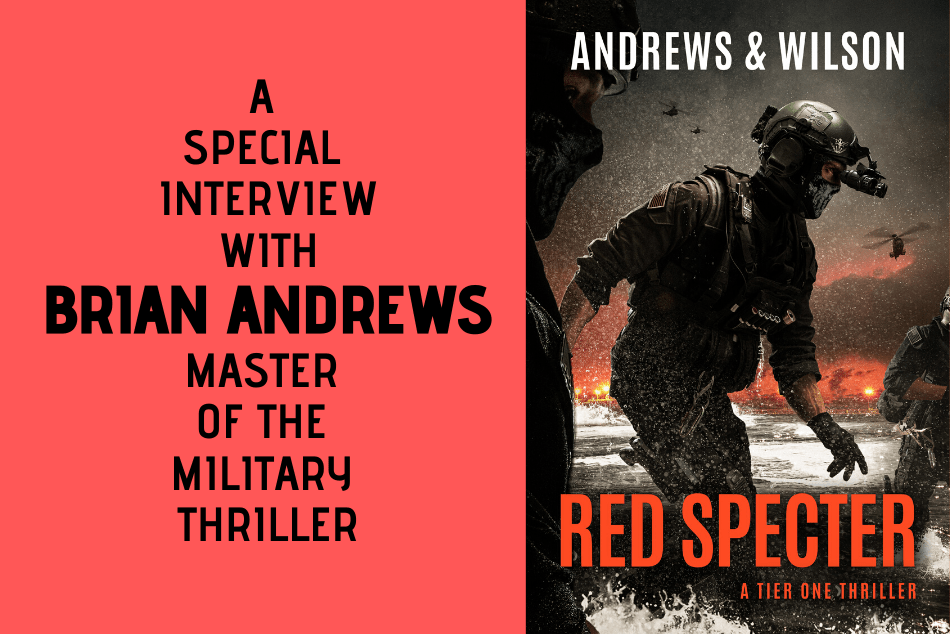It’s a big week here at Career Authors! Both Brian and Paula have book birthdays this week. We celebrated Paula’s with an interview a couple of weeks ago, now it’s Brian’s turn. You won’t want to miss this inside look at the brain and brawn behind one of the best special ops series around….
1) Give us the elevator pitch for RED SPECTER.
Sure, for those of you getting off the elevator on the next floor: RED SPECTER is Jason Bourne meets Seal Team…with Russians.
For those of you riding with me up to the 100th floor: When shadow operator and former Navy SEAL John Dempsey goes undercover to meet with a Vory arms dealer, he thinks he’s laying the groundwork to penetrate the Russian criminal underground. Instead, he walks into a trap orchestrated by Zeta, the secret Russian task force behind a series of destabilizing false flag operations around the world. A wicked game of strike and counterstrike ensues—sanctioned in the halls of the Kremlin and the White House but disavowed to the world. As the line between espionage, counterterrorism, and spec ops blurs, Dempsey and his team are ordered to eliminate their ultimate adversary, which means taking the fight against Zeta to Russian soil.
RED SPECTER is the fifth book in the Tier One series. All the books follow a covert task force of operators and analysts that conduct black ops around the world. These unsung heroes operate in the shadows, safeguarding American interests and American lives. If you like spy thrillers, action adventure, or military operations, then RED SPECTER will be right up your alley.
2) In today’s world, where reality trumps fiction every day, how do you come up with these blockbuster plot ideas?
RED SPECTER is a co-authored novel (Book 5 in the TIER ONE series) which I write with friend and fellow Navy veteran Jeff Wilson. For us, the key to coming up with big blockbuster plots happens during a collaborative brain storming period over several days before we put pen to paper. Every novel always begins with a question: “What if…?”
Example 1: What would happen if terrorists targeted the TIER ONE Navy SEALs and wiped out the entire unit?
Example 2: What would happen if Russia wanted to destabilize NATO by creating a rift between its two strongest members, the United States and Turkey?
The first example was the question that launched the TIER ONE series itself. The second was the question that gave birth to book 4 in the series, AMERICAN OPERATOR. The “what if” method is effective because it creates an instant vector—the story has direction and momentum right out of the gate. After we’ve settled on the most compelling “what if” question, the process of determining how the dastardly deed could be accomplished by the bad guys and how our hero should react begins!
3) Your novels are page turners of the first order. Any tips or tricks for writing such taut thrillers that you’d like to share?
Absolutely. I think our secret sauce is that we look for opportunities to insert tension, conflict, and uncertainty into every chapter. With ten thrillers under my belt now, I’ve come to realize that this is a two-step process. You have to be intentional about incorporating these elements when writing the rough draft. But after the first draft is complete, that’s when the real work begins. During the developmental editing phase, you have to be ruthless with yourself and ask questions like:
- Did that chapter make me concerned for the hero?
- Did I feel angst or outrage?
- Are the characters getting along too well?
- Did the dialogue evoke an emotional response in me?
- Do I feel the clock is ticking?
- Do I feel like danger is lurking on the next page?
If the answer to these questions is no, then you’re not doing your job. Nobody wants to read a thriller about a nice, safe, boring place with people who all get along. To make a book thrilling, a writer needs to create incentive for readers to turn the page. In the simplest possible terms that incentive is best understood as the desire to know how the conflict and uncertainty you’ve woven into the plot gets resolved.
4) What’s the hardest lesson you’ve had to learn as a writer?
Great question! As writers, we spend so much time researching, developing characters, and refining our plot and prose, that by the time a typical novel is finished we’ve spent hundreds if not thousands of hours writing it. Then, we give it to the world—naked, vulnerable, and unabashed—and we wait for judgment. And oh does that judgment come…
The hardest lesson for me has been accepting the fact that not everybody who reads my work will like it. And of the people who do like it, ninety-nine percent of them will not love it the way I do, nor will they notice and appreciate the nuance, metaphors, subtext, dialogue, foreshadowing, humor, emotion, conflict, and plot twists to the degree I hope they will.
For a time, I stopped reading customer reviews, because critical reviews were making me second guess decisions. But after giving it more thought, I came to the realization that I needed to have tougher skin. Negative reviews, trolls, haters, and difficult feedback is simply part of the business. Nowadays, I remind myself I’m writing for the fans, not the trolls. And besides, what’s the old adage, “You can please some of the people all of the time, all of the people some of the time, but you can’t please all the people all the time.”
5) We talk a lot about community here at Career Authors. What’s the most generous thing a fellow writer has ever done for you?
That’s easy, my coauthor Jeff Wilson has become the brother I never had. He’s my sounding board, advocate, confidant, cheerleader, and business partner. He’s a man of principle, good humor, and I know that no matter what he always has my back. Jeff and I met at Thrillerfest in NYC the summer of 2012, which is put on by the International Thriller Writers association (ITW). Just like Career Authors is a great community, ITW is a model organization where authors connect, blurb, coach, mentor, and support each other…so it’s probably no coincidence I met someone like Jeff there.
6) Yours is a collaboration–a marriage of writing minds, as it were. Tell us the secret to making your partnership with co-author Jeffrey Wilson work.
Well, Jeff picks all the nouns, I pick all the verbs, then we blend them together…
Seriously, all kidding aside, one of the greatest compliments for us as a co-author team is when a reviewer or a fan says they can’t figure out which author wrote which chapter because the voice was so seamless throughout. That singular, consistent voice is by design and the cornerstone of the Andrews & Wilson process. We give each other complete and total freedom to edit, revise and change any material in the book. We put our egos in the drawer and approach every novel as a total collaboration. What I mean by total collaboration, is that we eschew the concept of individual ownership. We never say things like, Brian wrote chapters 1, 3, 4, 7…and Jeff wrote chapter 2, 5, 6, 8, etcetera.
Every book is “our” book. This might sound like nuance, but it’s not. The finished product is what we celebrate and brag about, not our individual contributions.
7) Let’s end the interview by talking about John Dempsey, the hero of your Tier One military thriller series. What makes John Dempsey so compelling and what do you like most about writing this character?
The euphemism “actions speak louder than words” is John Dempsey personified. He’s the antithesis of a talking head. In a world dominated by television hypocrites and paid-for pundits, former Navy SEAL John Dempsey embodies those characteristics we all yearn for in a hero. He is steadfast, leads by example, and has an unwavering moral compass. A critic recently described Dempsey as “…the kind of hero that America needs at time when America needs him most.”
What I like most about Dempsey is that he does not see himself as a hero. In his mind, his teammates are the real heroes; he’s just a guy trying to follow orders and do his job. This perspective mirrors my real life experience serving in the Navy, where I worked alongside countless brave men and women who put their lives on the line every day. They didn’t serve because they wanted to be celebrated as “heroes.” They served because they wanted to protect and defend American values and principles. Heroes stand for something bigger than themselves, and that is something John Dempsey does in spades.
Join us on Facebook to talk thrillers and SEALs and heroes.






